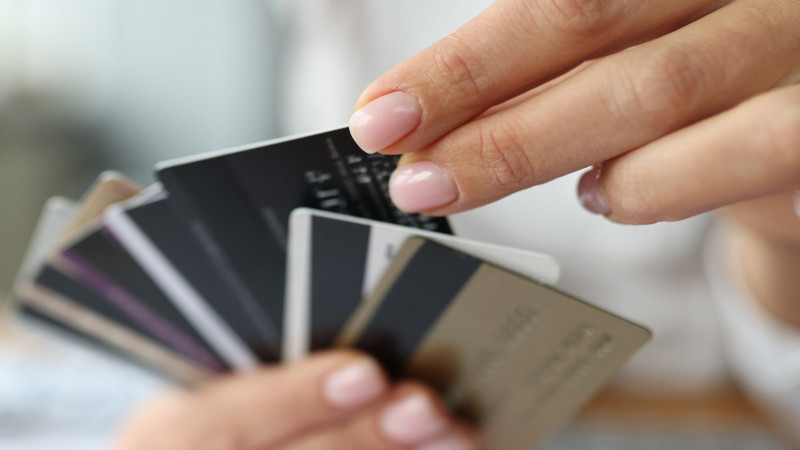Choosing the Right Credit Card for You
By
ASB November 09, 2021 | 5 MIN read PersonalAre you in the market for a new credit card? With all the options available, it’s hard to know which one is right for you. At American Savings Bank, we offer credit card options for everyone, whether you want cash back rewards or need to build your credit score. Let’s take a closer look at what to consider so you can decide what type of credit card is right for you.

KNOW YOUR CREDIT SCORE
Your credit score plays an important role in choosing the right credit card. Credit card issuers use your credit score to help determine your creditworthiness, or ability to pay back the money you borrow. Individuals with higher credit scores usually have more card options available to them. However, you can still get a great card with less than perfect credit — some cards are even designed to help you improve your score.
Check your credit score before you apply for a new credit card. You can check your credit score using a free tool online, such as Experian or FreeCreditReport.com. If you find your score is lower than you wanted, it might be best to wait before applying for a new card. This gives you time to boost your score and increase your chances of qualifying for better credit terms.
Here are a few steps you can take to potentially improve your credit score:
Pay Bills on Time: One of the main factors that lenders look for on your credit report is on-time bill payments. If you reliably pay your current bills on time, lenders usually assume you’ll pay them on time as well. Be sure to pay all of your bills on time each month, not just your credit card or loan payments. Bills like rent or utilities don’t usually directly impact your credit score but missing payments could lead to collection notices that may show up on your credit report.
Pay Down Revolving Credit Balances: Your credit utilization rate, or the amount of available credit you’ve spent, can change your credit score. A lower utilization rate could bring your credit score up because it potentially shows that you’re responsible with credit. For example, someone who is always maxing out their credit may not have the funds to pay off their balances, suggesting that they may not be able to afford the things they buy. Lower your utilization rate by paying down your existing balances and limiting how much you spend on your credit cards or other revolving debt, like personal lines of credit.
- Keep Unused Cards Open: Do you have an old credit card that you haven’t used in a while? Rather than closing it, keep it open to help your credit score in two ways. One, if you close your oldest account, your credit history becomes shorter. A longer credit history shows lenders that you’ve been responsibly using credit for a long time. Two, your credit card helps to increase your total amount of credit, which can help your utilization rate.

CONSIDER DIFFERENT TYPES OF CARDS
When selecting a card, carefully compare the benefits, such as a low interest rate and reward offers with the costs of a new card. With a high credit score, you can start to look at the different types of cards available.
Cards for Building Credit: Have you ever noticed how it seems like you need a good credit history to qualify for a credit card? This makes it hard to get your first credit account, which you probably need in order to build your credit score. The good news is, there are cards specifically designed for people who need to start a credit history or are rebuilding their credit score. These are known as secured credit cards which let you request your own credit limit (up to a certain amount) by putting down a security deposit. After making on-time payments for a period, most secured cards return your deposit and establish a credit score.
Cards to Pay Off Debt: You can use a credit card to help you pay off debt. A balance transfer card lets you move your existing credit card balance from your old card to a new one. The goal is to pay less in interest by getting a new card with a lower interest rate. The best balance transfer cards offer a 0% introductory interest rate for an initial period of time, letting you pay down your balance without adding more interest.
Cash Back Cards: Want to get a percentage of cash back every time you swipe your card? A cash back card might be right for you. Cash back cards give you a portion of the money you spend on your card back as a cash bonus. For example, a 1% cash back card can give you 1% of your purchases as a cash reward. If you spend $100, you’ll get $1 as a reward. You can usually redeem your cash back as a statement credit and some cards let you redeem cash back directly into your account.
- Rewards Cards: Similar to cash back cards, rewards cards let you earn rewards each time you use your card. Rewards are usually a percentage of your total spend and are usually awarded as cash back, points or travel miles. Redeeming your rewards depends on your card, such as exchanging points for gift cards, statement credits or travel purchases.
Remember to compare all credit card benefits – not just the rewards or interest rates. A lot of cards have additional perks you can use to access your account, monitor your credit score and pay digitally.
FIND THE RIGHT CARD FOR YOU
Choosing a new personal credit card doesn’t have to be overwhelming. You can make an appointment with one of our knowledgeable bankers or apply for a credit card online today!
Nothing contained in this material is intended to constitute legal, tax, securities or investment advice, nor an opinion that it is appropriate for readers. The information that is contained in this material is general nature. Readers should seek professional advice for their respective situations.




